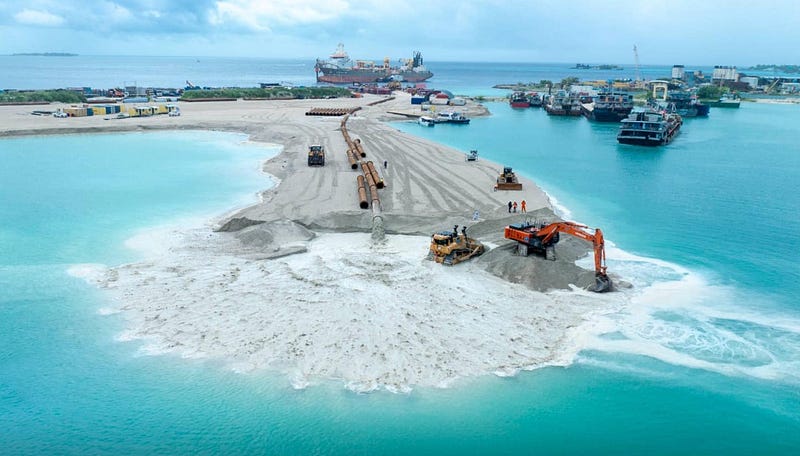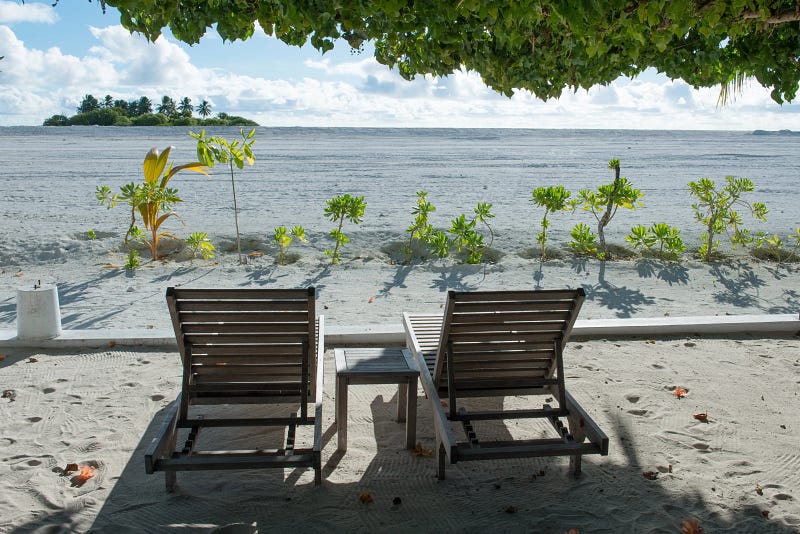Saving the Maldives: A Solution That Could Backfire
Written on
Chapter 1: The Reality of Land Reclamation
Imagine waking up to find the ocean that once lapped at your door replaced by a synthetic 130-meter beach. This is the new normal for residents of Addu, the southernmost atoll in the Maldives. This drastic change is a response to a pressing need: to keep the nation afloat in the face of rising sea levels.
The Maldivian government has been extracting sand, coral, and debris from the seabed to create new land. Without these efforts, much of the archipelago could be submerged by 2100, as 80% of the country lies less than 1 meter above sea level, making it highly vulnerable to the encroaching ocean.
However, this ambitious initiative has resulted in unintended consequences. The idyllic combination of sun, sand, and sea that once drew tourists to Addu is now overshadowed by an artificial landscape, pushing the ocean further from reach.
The potential repercussions of this land reclamation extend even further, threatening the delicate balance of coral reefs and seagrass meadows, and paradoxically increasing the Maldives' vulnerability to rising sea levels.

Chapter 2: The Global Context of Reclamation
Land reclamation is not unique to the Maldives; it has transformed many major coastal cities worldwide, including Singapore, London, New York, and Miami. Shanghai alone has added land equivalent to three times the area of Paris. Research indicates that 75% of large coastal cities have undertaken similar projects, collectively increasing coastal land by 2,530 square kilometers in this century.
As a chain of 1,200 islands in the Indian Ocean, the Maldives spans 820 kilometers but consists of over 99% ocean. The islands are primarily formed from coral atolls encircling lagoons, making land scarce—a significant driver for reclamation.
By 2018, approximately 50 islands had engaged in land reclamation, though experts believe this number may be understated.

Chapter 3: Population Pressures and Urban Planning
With a population exceeding half a million within just 300 square kilometers, the Maldives is one of the most densely populated countries globally. Each year, it attracts 1.3 million tourists, which constitutes 80% of its GDP. The capital, Malé, struggles under the weight of its population; covering only 8.3 square kilometers, it houses around 157,000 residents, leading to severe congestion.
To mitigate this issue, the government began reclaiming land on the nearby Hulhumalé atoll in the late 1990s. Designed with projections for sea-level rise by 2100, this “city of hope” aims for an elevation of 2 meters above sea level—double that of Malé.
The reclamation process involves vacuuming sand and coral debris from the seabed and depositing it to form new land, often filling entire lagoons. In December 2023, President Mohamed Muizzu initiated the Ras Male project, aiming to reclaim 1,150 hectares of land—three times the size of Hulhumalé. He touted it as a gateway for jobs and economic growth.
Nevertheless, critics voice concerns that while land reclamation may address the immediate need for development and adaptation to rising sea levels, it could inflict significant environmental harm.
The first video, "How the MALDIVES Plans to Survive SEA LEVEL RISE (shocking!)", explores the government's strategies and the potential ramifications of these land reclamation projects.
Chapter 4: Environmental Impacts and Controversies
The Addu Atoll land reclamation project has sparked significant controversy, as it threatens the UNESCO World Network of Biosphere Reserve, which is rich in coral reefs and marine biodiversity. An environmental impact report from Water Solutions in February 2022 warned of "long-term irreversible negative impacts" on both the local ecosystem and community, estimating damages to coral reefs and seagrass meadows, with potential losses in the fishing and tourism sectors.
Despite these warnings, the Environmental Protection Agency (EPA) approved the project, citing social benefits while neglecting the documented environmental risks.
The current plans for Addu involve dredging 6.9 million cubic meters of sand from the lagoon to create 231 hectares of land. Although the project’s contractor, Van Oord, claims to have relocated 73,000 corals, many of these relocated corals have not survived. Some coral reefs have been devastated by sedimentation from the reclamation process, leaving them vulnerable to further damage.
The second video, "How Would You Save The Maldives? (The 7 Choices)", delves into the difficult decisions facing the Maldives regarding land reclamation and sustainability.
Chapter 5: The Dilemma of Sustainable Solutions
As the reclamation projects proceed, the natural dynamics of the islands are altered, potentially encouraging development in regions more prone to storm surges or erosion. Coastal geographer Virginie Duvat highlights that creating new islands where none existed can lead to vulnerable land that requires extensive engineering solutions.
The consequences of disrupting natural ecosystems can be severe, as evidenced by the degradation of reefs that protect coastlines and support marine biodiversity. With unprecedented coral bleaching occurring due to rising ocean temperatures, the situation grows more dire.
Addu Atoll remains a serene, rural area marred by abandoned homes, as many residents lack the resources to build on their reclaimed land. Concerns persist that the benefits of land reclamation may not extend to the local population.
In conclusion, the challenges of rescuing the Maldives from climate change raise essential questions about the balance between development and environmental preservation. While land reclamation may provide temporary relief in overpopulated regions like Malé, its long-term impact on the environment remains uncertain.
Building a false sense of security might yield short-term gains, but the real test lies in the sustainability of these actions. The journey ahead is fraught with challenges, and awareness is crucial.
Thank you for your careful reading and continued support!
Join the 500+ Antarctic Sapiens community for weekly insights and updates.